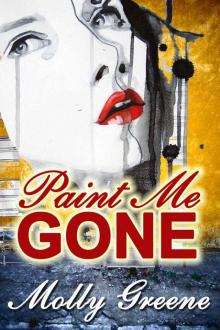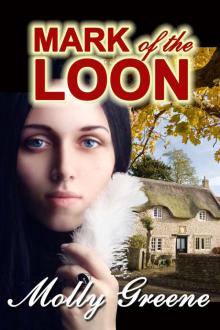- Home
- Molly Greene
Mark of the Loon (Gen Delacourt Mystery Book 1)
Mark of the Loon (Gen Delacourt Mystery Book 1) Read online
Mark of the Loon
© 2012 Molly Greene
www.molly-greene.com
~
COPYRIGHT NOTICE - ALL RIGHTS RESERVED
The content of this book is protected under Federal and International Copyright Laws and Treaties. Any unauthorized reprint or use of this material is prohibited. No part of this book may be electronically or mechanically reproduced or transmitted in any form or by any means, including photocopying, recording, or retention in any information storage and retrieval system, without express written permission from Molly Greene.
This is a work of fiction. Names, characters, businesses, locations, events, and incidents are either the product of the author’s imagination or used in a fictitious manner. Any resemblance to actual events or actual persons, living or dead, is purely coincidental.
e-book ISBN: 978-0-9855112-0-3
Also by Molly Greene: The Last Fairytale (excerpt included at the end), Paint Me Gone, A Thousand Tombs, and Swindle Town. Visit my Amazon Author page to see them all. For freebies, giveaways, deleted chapters, and periodic news about new releases, join my Reader’s Club.
~
Mark of the Loon
But hopes are Shy Birds flying at a great distance seldom reached by the best of Guns.
~ John James Audubon
~
Prologue
The thunderous boom of metal striking wood echoed through the room, too much like the report of distant cannon fire. Mallory Blackburne flinched and shielded her eyes, confused.
She was back in the war for a moment. Hiding.
Then the present overtook her.
Not Finland, the sitting room. The sound was the safe closing. She dropped her quaking hands and replaced the false facade and moldings. When she was satisfied the disguise would not be easily discovered, she closed the cabinetry and turned away.
Dusk had deepened while she worked. Shadows danced beyond the glass, and the gardens were barely visible through the mullioned panes.
She’d missed the chance to say goodbye.
Mallory straightened her dress and winced, then rubbed the knuckles of her left hand. When had her body grown so stiff? It seemed only yesterday she could kneel in the beds and plant bulbs for hours. Today she was an old woman with gnarled fingers and a face that was a wrinkled caricature of the familiar.
Age had slithered in, feigning friendship, only to swathe her body in this clever disguise. Time was always the victor. She wished she’d recorded her reflections about time, but no one was left to read her words. Even that would change one day.
The thought urged her on.
She pinned her braids into a bun and pulled on a sweater, then went down to the kitchen. The boy was leaning against the table, staring out the window like her twin. She tapped the counter and touched his arm. When he turned his head, she grasped his shoulders and eased him round to face her.
“I am ready.” She signed the words as she spoke.
No, he signed.
The boy’s stoic demeanor melted. His arms began to shiver as if he’d also felt the summons. He was small for his years but tough. Wiry. Aged beyond his decade. Just like a street-smart Ulster orphan would also have been back in the day. Impossible to believe a child could live a hard life in these times? Here was proof.
His fingers trembled. Will you come back?
Mallory offered a tentative smile, understanding his wish to delay the inevitable. “Perhaps,” she replied. Nothing she could say or do would ease the pain of this day.
With a rush, her resolve disappeared like a bird startled by a gust of wind. She gazed through the casement, picturing her beloved stronghold one last time. Darkness enveloped the cottage. There was nothing to see outside the pane but a hint of the wisteria that wound its way across a wooden lattice three feet away.
Seeking strength, she reached for the brown tabby curled on the upholstered window seat. The cat had been her talisman these past months. She ran her fingers head to tail, and he purred and moved against her.
She had loved deeply. How sad that it would come to this. The passing years were like a winter draft that crept under the door unseen, to freeze memories and isolate hearts. Alone was not how she would have written the ending had she been the playwright.
But now she sensed that the veil between worlds was thin. Unseen forces were plucking at her sleeve. A thousand icy siren’s voices whispered her toward home.
“I need your help,” she said, knowing he couldn’t hear her, then swung back to the boy. “Two favors.”
She drew a chain over his head and dropped a glittering pendant inside his shirt. To the average eye the golden bird was simply a locket, fashioned into a loon and entwined with her initials.
She didn’t speak of the secret concealed within.
“Hide this. Keep it safe and just between us, as always. You will know who should own the bird next. Choose with care when the time feels right, and you’ll not be misled.”
Then she handed him an envelope that held a hundred dollars, all in fives. “You know where to find more. But mind you cover your tracks.” Finally, she held out a letter. “Slip this to the postman. It’s important. A directive for the barrister.”
He shoved the packets in the back pocket of his jeans. She hugged him, and the child clutched her waist with the strength of a grown man. Mallory smoothed a wavy hank of his chestnut hair, shot with strands of red. The hair of an Irishman. She thought of her father and her throat tightened.
He pulled away and wiped his eyes. I will feed the birds, he signed.
“Keep yourself fed,” she signed and spoke in reply, hoping to appear lighthearted. “Our comrades will find their way.” She envisioned him tall and grown, smiling with a group of happy folk, looking confident and well. “And so will you. New friends will find you, although I suspect this house will stand empty for a time.”
What about Finny?
Her face quivered. “Finnegan will not be coming with me.” She swiped a tear from her own furrowed cheek. “The passage is mine alone to make. But he will be well cared for, if I get my way. Your paths will be one in the years ahead.”
She glanced away and whispered in Irish, “Go n-eírí an bóthar leat.” He touched her arm and questioned her with a look. She signed, may the road rise with you.
The road ahead stretches long and lonely, he replied.
“I’ll always be with you.” Courage failed her. She jerked a thumb toward the window and heaved a ragged breath before she spoke again. “You know where to find me.”
Don’t forget the way.
She could see he was close to tears. “I will watch out for you as best I can from where I’m going.”
The child turned to leave. When he stopped in the doorway and twisted around, his fingers flew. If you meet him, tell Edward how much I miss him.
Then he spoke aloud. “I’ll wait for you.”
The mention of her husband drove her thoughts to the puzzles she’d left, and the stranger who would unravel them. In her mind, she heard the dissonant clang of the safe door as it slammed shut for the last time. The words hidden inside were burned into her memory. I, Mallory Blackburne, being of sound mind this 23rd day of October.
Unable to speak, she could only nod and sign, Aye. I will tell him that, and a million other things.
Chapter One
Madison Boone drove the Toyota 4Runner slowly down the sweltering rural road, desperate for a sign of the property she’d been trying to locate for nearly half an hour. Not a breeze was stirring. Heat blistered off the asphalt like visible radio waves. Although the car’s AC blasted frigid air, its efforts were h
indered by the open window and the afternoon inferno that was inland Sonoma County in September.
Earth to Heaven. Turn down the temp!
She huffed a sharp breath upward to cool her forehead, then adjusted the scrunchy that held up her long dark hair. Her cotton dress was plastered to her spine against the sticky leather of the seat. She was roasting.
She couldn’t take much more.
A cold beer and a thermostat that registered 68 degrees would go a long way toward restoring her sanity, but that would have to wait. Giving up now was not an option.
Mill Creek Road was in a pricey older neighborhood near Lake Sonoma. The houses were set back from the street, and few could be seen. That was the problem. Although she’d found 1204 and 1208, she’d driven back and forth in a persistent effort to ferret out the address that should be somewhere in between.
Madison checked the time and shoved her cell into her pocket, then glanced again at the Board of Realtors paperwork riding shotgun beside her. She jabbed at the GPS for the hundredth time. Where had she gone wrong? Tapping the brake, she drew in a deep breath and tried to relax.
The roadside was dotted with the matchstick stalks and bright yellow flowers of Scotch broom. Plumes of Pampas grass swayed like silky mares’ tails above each thick hump of drying foliage. A lone buckeye reached thirsty branches toward the lake, reminding her of her own parched state.
The landscape out here was easy enough on the eyes.
What it lacked was house numbers.
Her attention was drawn by a bird in the branch of an apple tree. A grosbeak. They’d be migrating soon, bound for Mexico to feast on Monarch butterflies over the winter.
Wait. An apple tree. Out here in the brush?
The bird flitted away and landed atop an old post. The number 1206 materialized on it like a picture puzzle hiding an image. The rusty metal numbers hung askew, obscured by a long-neglected climbing rose. And like magic, beyond it she could now make out the driveway.
Her brain must be singed from the brutal weather.
The roses peppered the heavy late-summer air with perfume. Madison picked a bloom and held it to her nose, then dropped it on the dash and entered the hidden road. A deep layer of leaves covered the passage, but it was pushed aside here and there to expose patches of real cobblestone, probably sold off from a San Francisco street renovation long ago.
Was it a hint of what was to come?
A lopsided iron fence barred the way, vanquished by lack of care and the elements. She threw the transmission into park and climbed out to inspect the situation. The padlock wasn’t fastened. It creaked open with a push, and she drove into the shadows.
Beds of iris and dahlias and tangles of blooming perennials thrived along the entry road. A row of grapevines laden with fruit made her mouth water. Someone with a green thumb must have adored this jumble once.
She spotted the crepe-like saucers of a stand of Matilija poppies and with a pang recalled the gray-green leaves of the leggy native in her mother’s garden. Fried egg plant, they’d called it, because of its huge white petals, each with a yellow center. The perfect choice for the back of a flower bed, and happy as a lark soaking up Sonoma’s heat.
Unlike herself today.
She cleared the copse of overgrown shrubs that thronged the approach and rolled slowly, slowly onto an open circular drive.
An English cottage right out of the Shire was set back in the midst of the clearing. Built of native stone, it looked as if it had been picked up by a tornado in the Cotswolds Judy Garland-style and plopped down here among the rainbow hues of the abandoned garden.
Madison straightened in her seat and blinked in disbelief. “Toto, we’re not in Kansas anymore.”
The structure was an architect’s delight, all steep gabled slate roofs and tall chimneys and mullioned windows and rock.
While she drooled over the magical setting, she assessed the house’s exterior and the extent of the deferred maintenance. Hobbitesque windows screamed for a washrag, but the peeling woodwork and rotted wooden flower beds looked to be the worst of it.
“Hello, gorgeous. Oh, what I could do with you.”
She angled out of the car and headed up the overgrown path to the entry. The dry wood of the unpainted door begged for a healing coat of stain. She ran her fingers down the well-crafted casing, appreciating every inch of the grain, then knocked half a dozen times.
“Hello. Anyone here?”
Either no one was home, or the house was vacant. She rattled the door handle. Locked. She peered through the doorway’s peephole. A curtain over the pane obscured whatever was on the other side.
She scanned the drapes in hopes of a glimpse through the glass. Nothing. Turning away, she started down a path paved in yet more cobbles that looked as though it led toward the back.
Every imaginable summer-blooming flower lined the way. A cluster of hollyhocks as tall as a man and flush with multihued pastel blooms stood guard against the house. Butterfly bushes badly in need of pruning arched branches dense with purple flower spikes over the passageway. The smell of lavender was soon overtaken by the sweet, cloying tang of mint as she crushed the trailing plant beneath her shoe.
Eventually, she burst through into bright sunlight once again and faced a gentle slope dotted with trees. A hundred feet away a two-story carriage house stood with its back against a knoll. It was a twin to the main building, with an apartment above the garage.
Beyond it an open shed protected a hoard of split wood. No other homes were visible.
The rear of the cottage was to her left, and she followed the path until it flowed onto a wide terrace. A weathered gazebo graced the far side. At one end was a lovely pond, sprawling and neglected but still full of water. Birdbaths and whimsical feeders were placed around the yard. She could imagine the Audubon heaven the property was once upon a time.
Even now, the place irresistible.
Double French doors opened from every room onto the patio where she stood, designed to take advantage of the valley vista beyond. She squinted into the sun and caught a glimpse of the lake in the distance. Water glistened below the steep, brush-covered hills.
When she turned back, the painted roof turrets caught her eye. The attic vents were disguised as purple martin houses, perched atop the steep gables. Someone went to a lot of trouble to invite the swallows to return from South America come spring.
She moved to the doors and shimmied a handle back and forth without luck, then tried the next and the next with the same result. Curtains shielded the interior from prying eyes here, as well. She walked along the south wall and worked the doors with a similar outcome. She was about to give up and investigate the carriage house when the glint of glass revealed yet another leaded pane hidden behind an enormous heritage rose.
Madison shifted the thorny canes aside.
The window was half an inch ajar.
Ignoring her summer garb, she hoisted herself onto the sill, sorry she’d added that extra ten pounds last winter. “Dang junk in the trunk,” she muttered.
When her eyes adjusted, she made out the outline of chairs and couches beyond the open door. A furnished living room. She walked to the wall of French doors and whipped back the drapes, then turned to scope out the room.
Madison giggled aloud at the captivating scene.
The décor screamed English countryside. A flowered carpet covered much of the pine floor. Slip-covered couches and chairs were placed before the fireplace. Primitive furniture added to the gorgeous vignette.
Built-in bookshelves sported framed photographs among the hard-backed tomes, dominant among them a gray-haired couple with arms entwined, smiling at one other and ignorant of the camera.
The bones of the bungalow were fabulous. The plaster walls and high ceilings appeared to be in good shape. The vintage wallpaper would definitely need to go, but with luck, once stripped of the paper, the walls would simply need a coat of paint.
Even a real estate novice would see th
e potential here.
It all seemed in good condition. But while the lack of dust opposed the appearance of the yard, it also conveyed a message.
Somebody was taking care of the house.
She shifted out of appraisal mode and hurried on.
A homey old-fashioned kitchen came next, complete with a massive antique cabinet built into the thick plaster. Another door led to a dining area, accessible from the living room but its own separate space. Downstairs the floor plan was open. She wondered how the upstairs space would stack up. It wouldn’t be the first time she’d removed a wall to bring in light.
Enchanted, she clapped her hands and whispered, “Please, please, mine, mine, mine!”
The sound of a car cut off Madison’s glee and sent her, frightened and cursing, to sweep the drapes closed and rush head-first back through the window. She nearly fell in the dirt below, but managed to avoid the rose thorns that tried to scratch at the back of her legs as she slipped from the sill.
She plunged the window down and ran onto the terrace to smooth her hair and skirt. A glance at the glass doors reassured her that the curtains were not swaying.
And not a minute too soon.
A tall, slender man with a short Ivy League haircut stepped around the house and stopped, hands folded, before her. Madison raised an eyebrow at the sight of his minister’s collar, then cocked her head to one side and smiled.
“You caught me.”
The man cleared his throat and ran a hand through his brown curls. “I’m Reverend Ryan Kavanaugh, Assistant Rector of the Protestant retreat just over the hill. What did I catch you doing?”
His voice held the hint of an Irish brogue.
Surprised, Madison said, “Excuse me?”
At least half a foot taller, he leaned forward before he spoke, as though she might be hard of hearing. “I was out for a walk and happened to look down and see your car.” His words were clipped. “May I ask the nature of your visit?”

 A Thousand Tombs
A Thousand Tombs Paint Me Gone (Gen Delacourt Mystery Book 3)
Paint Me Gone (Gen Delacourt Mystery Book 3) The Last Fairytale (Gen Delacourt Mystery Book 2)
The Last Fairytale (Gen Delacourt Mystery Book 2) Mark of the Loon (Gen Delacourt Mystery Book 1)
Mark of the Loon (Gen Delacourt Mystery Book 1) A Thousand Tombs (Gen Delacourt Mystery Book 4)
A Thousand Tombs (Gen Delacourt Mystery Book 4)